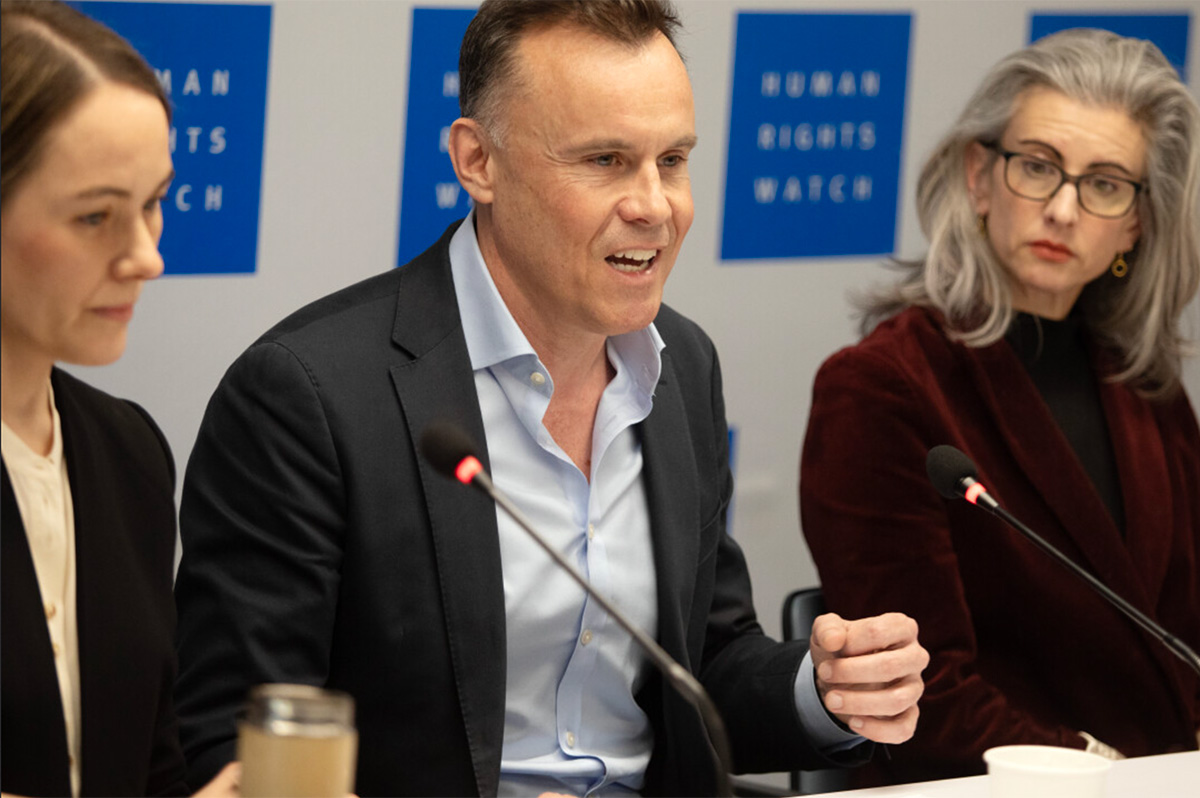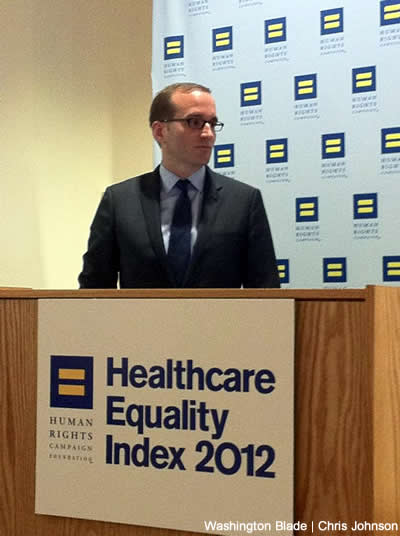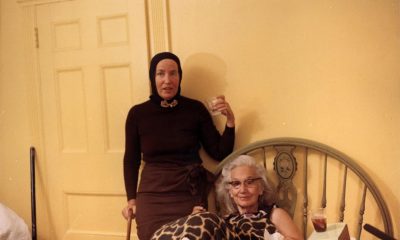National
HRC, Sebelius unveil report on medical facilities
Evaluating LGBT-friendliness of hospitals, other providers

Human Rights Campaign President Chad Griffin and Secretary of Health & Human Services Kathleen Sebelius unveiled HRC’s annual report evaluating the LGBT friendliness of medical facilities throughout the country at a media appearance Tuesday.
The two appeared together at a news conference at Howard University Medical Center — a facility that received a perfect score in the new report — to talk about the findings in HRC’s 2012 Healthcare Equality Index, which is the fifth such report from the organization.
Griffin said during the news conference that medical facilities shouldn’t deny a patient the ability to see a loved one — whether it’s a same-sex or opposite-sex partner — while visiting a hospital.
“At no time are we more vulnerable than when we’re lying on an emergency room gurney or in a hospital bed,” Griffin said. “It’s a scary time; not a time to be alone, and we desperately need our loved one by our side. And of course, that’s exactly where they want to be, not sitting in a waiting room feeling scared or helpless, or even worse, in a car racing home to find legal papers that prove our relationships while critical medical decisions are being made without us.”
Sebelius noted the Obama administration’s work on improving LGBT health, mentioning accomplishments such as the hospital visitation memorandum and a move to bar insurers from discriminating on the basis of LGBT status.
“A lot of these improvement don’t get the biggest press headlines, but they reflect how every day in dozens of small ways every agency and division in our department is working to make things better for LGBT individuals and families we serve,” Sebelius said.
This year’s index includes 407 respondents that volunteered to fill out a survey on key aspects of treatment of LGBT patients and staff, including patient non-discrimination policies, visitation polices, employment non-discrimination policies and training in LGBT patient-centered care.
The report saw a 40 percent increase in participating respondents from last year. Additionally, there were 237 facilities — a 162 percent increase — in facilities that received a perfect score and were dubbed a “Leader in LGBT Healthcare Equality.”
Wayne Frederick, Howard University provost and chief academic officer, said Howard University Hospital was “delighted” to be included among the facilities that received a perfect score in the index.
“Patient-centered care is a universal standard and is expected of all health care providers and health care institutions,” Frederick said. “It is a standard that is deserved by all people regardless of race, nationality, gender, sexual orientation or gender identity.”
The D.C.-based Whitman-Walker Health also received a perfect score in the index and is the only non-hospital organization in the district to receive a perfect score in the report.
Don Blanchon, Whitman-Walker’s executive director, said he’s “excited and honored” his organization’s work has been recognized by HRC.
“Whitman-Walker was founded more than 30 years ago to offer high quality and affirming health care for metropolitan D.C.’s LGBT community at a time when that was almost non-existent,” Blanchon said. “We are very proud to not only be recognized but to join the company of other health care groups around the nation who are working to ensure equal access to high quality care.”
Although more facilities than ever volunteered to fill out the survey, 18 states aren’t represented: Alaska, Idaho, Montana, Wyoming, Colorado, New Mexico, Oklahoma, Kansas, Nebraska, North Dakota, South Dakota, Arkansas, Louisiana, Mississippi, Alabama, West Virginia, Vermont and Connecticut.
On the same day that HRC issued its report, the Department of Health & Human Services issued its own annual report identifying seven key LGBT accomplishments in the past year as well as goals moving forward. Among them are the National Institutes of Health issuing a report identifying LGBT health gaps and opportunities; the Centers for Disease Control issuing data on domestic violence for LGBT couples; and the Centers for Medicare & Medicaid Services making a training video about LGBT elder Americans.
Griffin emphasized the importance of health care equity by narrating his own story about making his first visit to the doctor after coming out as gay while living in Los Angeles and wanting to correct his patient record by saying he had previously incorrectly identified as straight.
“My doctor didn’t make me feel comfortable,” Griffin said. “He didn’t sort of have the answers to the questions and I didn’t feel comfortable, which is what I expected with my doctor. So, I left and I immediately changed doctors and got a doctor that was referred by friends, and I was very comfortable with being honest with that doctor and asking every question I had as a young person struggling to come out of the closet. That was so important and so helpful.”
CORRECTION: An earlier version of this article said Whitman-Walker was the only non-hospital organization to receive a perfect score in the Healthcare Equality Index. It’s the only non-hospital organization in D.C., not the country. The Blade regrets the error.
Puerto Rico
Bad Bunny shares Super Bowl stage with Ricky Martin, Lady Gaga
Puerto Rican activist celebrates half time show

Bad Bunny on Sunday shared the stage with Ricky Martin and Lady Gaga at the Super Bowl halftime show in Santa Clara, Calif.
Martin came out as gay in 2010. Gaga, who headlined the 2017 Super Bowl halftime show, is bisexual. Bad Bunny has championed LGBTQ rights in his native Puerto Rico and elsewhere.
“Not only was a sophisticated political statement, but it was a celebration of who we are as Puerto Ricans,” Pedro Julio Serrano, president of the LGBTQ+ Federation of Puerto Rico, told the Washington Blade on Monday. “That includes us as LGBTQ+ people by including a ground-breaking superstar and legend, Ricky Martin singing an anti-colonial anthem and showcasing Young Miko, an up-and-coming star at La Casita. And, of course, having queer icon Lady Gaga sing salsa was the cherry on the top.”
La Casita is a house that Bad Bunny included in his residency in San Juan, the Puerto Rican capital, last year. He recreated it during the halftime show.
“His performance brought us together as Puerto Ricans, as Latin Americans, as Americans (from the Americas) and as human beings,” said Serrano. “He embraced his own words by showcasing, through his performance, that the ‘only thing more powerful than hate is love.’”
National
Human Rights Watch sharply criticizes US in annual report
Trump-Vance administration ‘working to undermine … very idea of human rights’

Human Rights Watch Executive Director Philippe Bolopion on Wednesday sharply criticized the Trump-Vance administration over its foreign policy that includes opposition to LGBTQ rights.
“The U.S. used to actually be a government that was advancing the rights of LGBT people around the world and making sure that it was finding its way into resolutions, into U.N. documents,” he said in response to a question the Washington Blade asked during a press conference at Human Rights Watch’s D.C. offices. “Now we see the opposite movement.”
Human Rights Watch on Wednesday released its annual human rights report that is highly critical of the U.S., among other countries.
“Under relentless pressure from U.S. President Donald Trump, and persistently undermined by China and Russia, the rules-based international order is being crushed, threatening to take with it the architecture human rights defenders have come to rely on to advance norms and protect freedoms,” said Bolopion in its introductory paragraph. “To defy this trend, governments that still value human rights, alongside social movements, civil society, and international institutions, need to form a strategic alliance to push back.”

The report, among other things, specifically notes the U.S. Supreme Court’s Skrmetti decision that uphold a Tennessee law banning gender-affirming medical interventions for minors.
The Trump-Vance administration has withdrawn the U.S. from the U.N. LGBTI Core Group, a group of U.N. member states that have pledged to support LGBTQ and intersex rights, and the U.N. Human Rights Council. Bolopion in response to the Blade’s question during Wednesday’s press conference noted the U.S. has also voted against LGBTQ-inclusive U.N. resolutions.
Maria Sjödin, executive director of Outright International, a global LGBTQ and intersex advocacy group, in an op-ed the Blade published on Jan. 28 wrote the movement around the world since the Trump-Vance administration took office has lost more than $125 million in funding.
The U.S. Agency for International Development, which funded myriad LGBTQ and intersex organizations around the world, officially shut down on July 1, 2025. The Trump-Vance administration last month announced it will expand the global gag rule, which bans U.S. foreign aid for groups that support abortion and/or offer abortion-related services, to include organizations that promote “gender ideology.”
“LGBTQ rights are not just a casualty of the Trump foreign policy,” said Human Rights Watch Washington Director Sarah Yager during the press conference. “It is the intent of the Trump foreign policy.”
The report specifically notes Ugandan authorities since the enactment of the country’s Anti-Homosexuality Act in 2023, which punishes “‘carnal knowledge’ between people of the same gender” with up to life in prison, “have perpetrated widespread discrimination and violence against lesbian, gay, bisexual, and transgender (LGBT) people, their families, and their supporters.” It also highlights Russian authorities “continued to widely use the ‘gay propaganda’ ban” and prosecuted at least two people in 2025 for their alleged role in “‘involving’ people in the ‘international LGBT movement’” that the country’s Supreme Court has deemed an extremist organization.
The report indicates the Hungarian government “continued its attacks on and scapegoating of lesbian, gay, bisexual, and transgender (LGBT) people” in 2025, specifically noting its efforts to ban Budapest Pride that more than 100,000 people defied. The report also notes new provisions of Indonesia’s penal code that took effect on Jan. 2 “violate the rights of women, religious minorities, and lesbian, gay, bisexual, and transgender (LGBT) people, and undermine the rights to freedom of speech and association.”
“This includes the criminalization of all sex outside of marriage, effectively rendering adult consensual same-sex conduct a crime in Indonesia for the first time in the country’s history,” it states.
Bolopion at Wednesday’s press conference said women, people with disabilities, religious minorities, and other marginalized groups lose rights “when democracy is retreating.”
“It’s actually a really good example of how the global retreat from the U.S. as an actor that used to be very imperfectly — you know, with a lot of double standards — but used to be part of this global effort to advance rights and norms for everyone,” he said. “Now, not only has it retreated, which many people expected, but in fact, is now working against it, is working to undermine the system, is working to undermine, at times, the very idea of human rights.”
“That’s definitely something we are acutely aware of, and that we are pushing back,” he added.
Maryland
4th Circuit dismisses lawsuit against Montgomery County schools’ pronoun policy
Substitute teacher Kimberly Polk challenged regulation in 2024

A federal appeals court has ruled Montgomery County Public Schools did not violate a substitute teacher’s constitutional rights when it required her to use students’ preferred pronouns in the classroom.
The 4th U.S. Circuit Court of Appeals in a 2-1 decision it released on Jan. 28 ruled against Kimberly Polk.
The policy states that “all students have the right to be referred to by their identified name and/or pronoun.”
“School staff members should address students by the name and pronoun corresponding to the gender identity that is consistently asserted at school,” it reads. “Students are not required to change their permanent student records as described in the next section (e.g., obtain a court-ordered name and/or new birth certificate) as a prerequisite to being addressed by the name and pronoun that corresponds to their identified name. To the extent possible, and consistent with these guidelines, school personnel will make efforts to maintain the confidentiality of the student’s transgender status.”
The Washington Post reported Polk, who became a substitute teacher in Montgomery County in 2021, in November 2022 requested a “religious accommodation, claiming that the policy went against her ‘sincerely held religious beliefs,’ which are ‘based on her understanding of her Christian religion and the Holy Bible.’”
U.S. District Judge Deborah Boardman in January 2025 dismissed Polk’s lawsuit that she filed in federal court in Beltsville. Polk appealed the decision to the 4th Circuit.
-

 a&e features4 days ago
a&e features4 days agoMarc Shaiman reflects on musical success stories
-

 Television4 days ago
Television4 days agoNetflix’s ‘The Boyfriend’ is more than a dating show
-

 Opinions4 days ago
Opinions4 days agoSnow, ice, and politics: what is (and isn’t) happening
-

 Movies4 days ago
Movies4 days ago50 years later, it’s still worth a return trip to ‘Grey Gardens’





















